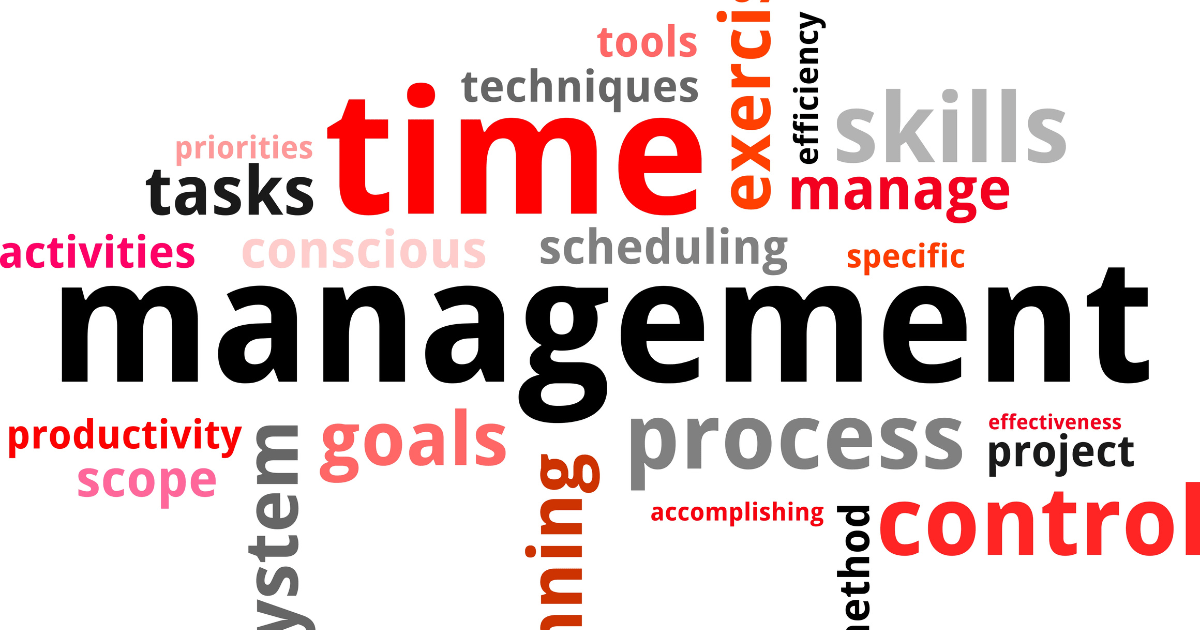We all know that good time management is a key strength for successful business leaders. After all, the more successful you are, the more demands there are on your time. And while technology is meant to help us become more effective and efficient with our time, it also seems to find more ways in which other people can grab your attention!
But good time management is not a skill you learn just once and rely on to carry you through the rest of your professional life. Not only is new technology developing faster than ever-before, but your priorities change as your business develops.
Your team grows and you gain more clients. You work with more suppliers, or service providers, and perhaps engage in more collaborations, and joint ventures. More meetings need to be arranged and attended, with probably more travel involved. All these new people and increased activities bring more demands on your time.
This makes learning to manage your time more effectively an ongoing process. It’s likely the skills you needed 2 years ago will not be sufficient to match your needs today. So, what are some effective ways to improve your time management skills?
Here we consider 5 ways to improve your time management skills that you can review again and again, allowing you to adapt your time management skills as your business grows.
1. Productivity Patterns
Productivity patterns are understanding the times of the day, or week, when you are at your most focused, alert, and energised. In other words, the times you get your best quality work done!
In the business world, you often have to fit in with other people. But understanding your productivity patterns helps you plan to do your most important work, at the times when you are most naturally productive,
Here are the typical productivity patterns:
Are you a morning person?
Many people find they are at their most alert and productive first thing in the morning. Their headspace is fresh, and they’re ready to tackle any complex tasks or creative work. If they’re always trying to arrange early morning meetings, you will know they’re a morning person.
Are you an evening person?
And quite obviously, evening people are at the opposite end of the scale. They’re simply not good first thing in the morning. But when we say, ‘evening person’, this could mean your most productive time could be any time from late afternoon, stretching into the evening, or even later!
If you do recognise yourself as an evening person, there’s no point trying to fit in with the early morning crowd or be part of the 5am club!
The mid-afternoon dip
This is common to many people, the two or three hours after lunch time when their energy is low. For some, this is caused by their natural circadian rhythm. For others, it could be tiredness from eating lunch. If you’re holding a meeting, try and arrange it for the morning, unless you don’t mind a few people nodding off!
Are you really a weekend person?
There are those that find weekends are a great time to focus on bigger projects, or work that requires deep concentration. Or there may be specific days of the week when they are laser focused. If this is you, then re-arrange your working week around these days.
Of course, not everything is as black and white as this.
Your energy levels may be more even throughout the day, in which case it doesn’t affect you as much. Or external factors may change the demands on your time, which could affect the times you are most energised.
There will be times when clients insist on meetings when you’re not at your best, or other meetings are arranged out of your control. But by recognising your productivity pattern, whenever possible, schedule work that requires intense concentration, at times that are most productive for you.
A final thought on this. If you’re working closely with someone on a project, and you know their productivity pattern, would it be worth specifically arranging meetings with them to match their productivity pattern? Particularly on occasions when you need them to be at the top of their game.
2. Time-Wasting Activities
We all know many of the common time-wasting activities. Let’s be honest, we’ve all been guilty of many of them at some point! But recognising your biggest time-wasting activities can help you learn to manage your time more effectively.
Here are some of the biggest time-stealers:
Poor planning
With poor planning, or no planning, decision-making suffers, and inefficiencies quickly creep in. It’s difficult to break bigger tasks into smaller, simpler steps. And if a mistake has been made, it can take longer to spot, and correct.
Procrastination
Poor planning is just one of the causes of procrastination. Feeling overwhelmed, fear of getting something wrong, or poor motivation also contribute to putting off a task. There are many strategies that can help, research the ones that can work for you.
Poor prioritisation
Procrastination can also be a result of poor prioritisation. Again, there are many strategies to help with prioritising your tasks effectively. One of these is the Eisenhower Matix, which is a great way of prioritising your ‘to do’ list. Research carried out in the UK found this to be the most successful time management technique.
Multitasking
Science tells us that by multitasking, we’re constantly switching between tasks. And that means we’re constantly leaving one task, without finishing it, to do another task. Studies have shown that we take longer to complete a task when multitasking and produce more errors in the process! Why?
Our brains must process more information by constantly switching from one task to the next, having to continually recall information with each switch. Every time you switch between tasks, you’re distracting yourself from what you were doing.
Working on one task only though, is far more efficient for your brain because it only needs to focus on one subject. More importantly, it’s also far more efficient in getting the task done!
Too many meetings
According to a 2016 article in Inc.com, there are 25 million meetings daily in the US alone. It adds that executives have admitted these meetings are failures, meaning organisations are wasting time and money with unnecessary meetings.
Productive meetings have a clear objective and agenda. If you’re invited to a meeting but there’s no obvious clear objective, discuss this with the organiser. It may help clarify in their mind what the purpose is, thereby ensuring the meeting is more organised and time efficient, or even better, it may turn out you don’t need to attend!
Social media
What more do we need to say about social media when it comes to good time management? We all know social media can be a huge distraction. Yes, there are tools that block, or at least limit, access to specific websites. But really it comes down to being disciplined to only scroll through your feeds when you have completed your work, or when you’re having a break.
In many ways these time-wasting activities are the ‘low hanging fruit’ for improving time management. Implementing simple changes in areas that cost significant time can quickly increase productivity.
3. Adaptability
The business world is never constant and predictable. Situations can change without warning, along with the demands on your time! This means you must be prepared to be adaptable.
Here are a few ideas:
Scheduling
Avoid scheduling every minute of your day, such as back-to-back meetings. Of course, know what you want to achieve each day, but also have a flexible mindset. Allow space in your schedule so you can be flexible when something unexpected occurs. Being too rigid with your schedule leads to frustration when you need to suddenly change focus.
Re-evaluate
Changing and evolving situations require constant decision making. In a fast-paced environment, it’s easy to make decisions that move you away from your goals. Regularly re-evaluate your actions and priorities to ensure you are still on track.
Distractions
Daily distractions are inevitable. A successful business leader learns how to handle their common distractions, such as turning off notifications, and checking emails at specific times of the day. Being adaptable is developing strategies to stay focused on the task in hand, despite the distractions that come your way.
Stress
Another inevitability is that there will be times when you are under increased stress. Get into the habit of managing stress in ways that work for you. Examples include taking regular breaks, getting some fresh air, exercise, or practicing mindfulness. A relaxed and clear mind makes better decisions.
The big picture
This ties in with regularly re-evaluating your actions and priorities. Being flexible and adaptable on a daily basis is necessary, but never lose sight of your long-term goals. Constantly remind yourself of your ‘big picture’ and ensure that all decisions are helping you progress in that direction.
Effective time management requires the ability to adapt to the current, and often changing, situation. But also, with the ability to stay on track with your daily and long-term goals.
4. Flexibility
Being adaptable to change also requires flexibility in your approach to time management. Here are some reasons why this is important:
Changing priorities
A new enquiry from a client, fresh information from your sales team, or the latest industry trends. These are just some of the outside factors that can cause priorities to change. Being flexible allows you to quickly make the necessary changes.
Unexpected events
A flexible approach helps you deal with the unexpected. This could be an urgent request for your help, a meeting you’re asked to attend at short notice, or a colleague phoning in sick. A flexible mindset helps keep you in control and maintain productivity.
Efficiency and productivity
Having a flexible mindset helps you to respond faster if you realise some processes could be improved. Or, if there are some time-wasting activities that should be eliminated. Identifying and dealing with these can improve efficiency and increase productivity.
Work-life balance
Time management not only affects work, but also your home-life. A flexible mindset contributes to a healthy work-life balance because you’re not bound by a rigid work schedule.
Reducing stress
We’ve talked about stress, and being flexible with your time management can be a great antidote to this. Rather than feel overwhelmed, be creative and adaptable when unexpected events happen, or demands on your time increase. Give yourself the luxury of flexibility!
Opportunities
Having a flexible outlook helps you to spot opportunities and, more importantly, grab those opportunities. These opportunities can come in various forms, e.g. new business, new collaborations, or personal growth. Being flexible to seek out new challenges can make a big difference in the growth of your business.
A flexible approach to time management helps you deal with the inevitable challenges far more effectively.
5. Learn and Adapt
Time management is a constantly evolving process. And so, as your business evolves, it’s worthwhile to review your time management practices. This can provide new learning opportunities in your business and identify how you can adapt your approach.
Identify time-wasting activities
Are there activities that take up too much time, compared to the contribution they make to your goals? Can you eliminate these, or make them more efficient, to increase productivity?
Task prioritisation
Are you prioritising tasks in the most efficient and effective way? Take this learning opportunity to fine-tune your decision-making process.
Time estimation
How accurate are you when estimating the time required for certain tasks? Learning whether you overestimate or underestimate, and why, improves your planning processes.
Productivity patterns
Are you planning your day in a way that matches your productivity patterns? It’s easy to lose sight of the times when you are at your most focused, alert, and energised.
External distractions
A time management review can identify any external distractions that affect productivity. This can be a very effective learning for your business. It can help you develop strategies to eliminate, or at least minimise, these distractions.
Time management effectiveness
How effective are the time management strategies you are using? Has your business evolved to the point where they are not so effective now? What can you do to refine or optimise your time management?
Challenges and failures
Have there been challenges, or failures, where you have not met deadlines, or you’ve not managed your time effectively? In any field, learning from failure can provide the biggest learnings. Review these setbacks and develop strategies to handle similar situations in the future.
The purpose of reviewing your time management practices is not to dwell on what has not worked. It is to learn where you can improve, and adapt what you are doing, to enhance your effectiveness.
And finally…
So, these are our ‘5 ways to improve your time management skills’.
There is a lot of scope here to develop your time management skills. Don’t try and take on everything at once. Pick a few skills to work on initially, ones that you feel you can quickly pick up.
Get good at these first set of skills and turn them into habits. Then, move onto a few more skills and do the same. Continue working through these skills until you become a Time Management Master!




